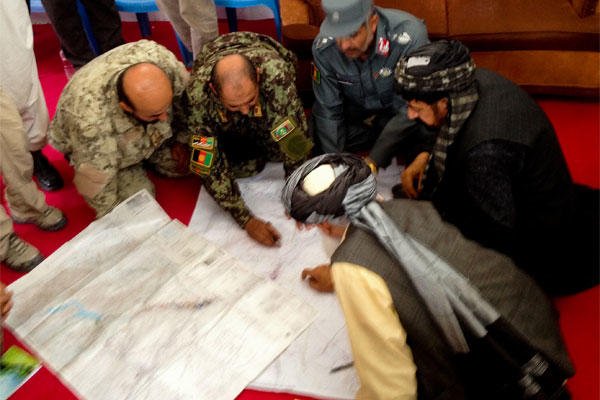FORWARD OPERATING BASE SABIT QADAM, Afghanistan — It has been seven long months for the Marines and sailors of 1st Battalion, 7th Marines, Regimental Combat Team 6, but they will soon return home to family and friends from Sangin, Afghanistan.
The Marines faced a difficult task at a difficult time for both the Marine Corps and Afghanistan. They watched as temperatures rose to more than 120 degrees Fahrenheit and tensions in the region became more intense with each passing day.
“Our primary mission was to develop the capabilities of the Afghan National Security Forces,” said. Lt. Col. David Bradney, commanding officer of 1st Battalion, 7th Marines. “The second part of the mission was to defeat the insurgency in Sangin, Afghanistan.”
For seven months, the Marines worked with Afghan Forces, training the Afghan Local Police, Afghan National Civil Order Police and Afghan National Army soldiers.
The Marines partnered with ANSF during training and operations. They continued the work of previous battalions, strengthening the ANSF.
“We are trying to develop the capabilities of the ANSF while beating back the insurgency to allow the government of Afghanistan to more proactively govern the citizens of Afghanistan,” said Bradney, from San Antonio.
The battalion assigned more Marines to train the Afghan forces than any of the previous battalions in the area. They organized an infantry company specifically to work with the Afghan Forces. Through the efforts of the 191 Marines in Alpha Company, the Afghan forces received more individualized training.
“Most battalions previously came with 60 to 70 Marines devoted to that mission,” said Bradney, referring to training the Afghan forces. “With 191 Marines specifically for that mission, we were able to work with the individual policeman all the way up to the chief of police.”
The additional attention helped the ANSF develop an independence from the Marines.
“They are able to plan and coordinate amongst themselves,” said Bradney. “We knew they were always able, but now they are more willing to conduct independent operations. Now they go out regularly by themselves.”
The Marines also conducted partnered operations throughout Sangin and the upper Helmand River valley. The battalion operated during the summer fighting season, and the Marines saw plenty of action.
They were involved in more than 300 direct firefights and found approximately 300 improvised explosive devices. The battalion suffered 39 casualties and six fallen heroes.
“The hardest part is coping with the casualties and the heroes,” said Sgt. Major Keith Coombs, battalion sergeant major, 1st Battalion, 7th Marines.
Coombs had Marines construct a memorial – what he calls an honor garden – to honor the previous battalions that served in Sangin and their fallen brothers.
“I wanted to make sure the Marines that came before us would always be remembered,” said Coombs.
The Marines faced a difficult situation when they arrived in the spring. Not only were they deploying at the start of the fighting season, but they were arriving fresh off of the heels of controversy involving the Marine Corps and Afghanistan.
“We came at a critical time,” said Coombs, from Noble, Okla. “We needed a unit to come in here and really do it right. The Marines knew they had to do it right. The Marine Corps needed them to do it right, and they did it right.”
The battalion knew their actions would be under intense scrutiny, and they couldn’t afford any slip-ups.
“Our non-commissioned officers made tough decisions with the rules of engagement and all the things that come with having to make on-the-spot calls during firefights,” said Coombs. “That impressed me the most. NCOs making the right call and wanting to do it right every single day.”
As the Marines strengthened the ANSF and helped rid the area of insurgent activity, the people of Sangin witnessed positive trends in their security and their economy.
“A lot of people thought that security in Sangin was unachievable,” said Coombs. “They said Sangin couldn’t be tamed. The security couldn’t be good because it was always too kinetic in the area.”
With battalion level operations specifically designed to clear the city and the surrounding green zones, the Marines began to see changes.
“For the first time, I think ever, we have a very good security situation here,” said Coombs.
In addition to the increased security, the local bazaar increased by more than 500 new shops.
“When we got here there were 1,000 stalls and now there are over 1,500 stalls,” said Bradney, “It shows that people are willing to invest, and there are enough people to support the additional stalls.”
The people of Sangin also saw great strides in their local government. Earlier this year, 1st Battalion, 7th Marines, witnessed the first election of a district security council.
Bradney said the council works with the governor and relays the needs and wants of the Afghan people.
Now 1st Battalion, 7th Marines, passes the torch to 2nd Battalion, 7th Marines. The new battalion will continue strengthening the ANSF and supporting the Sangin Government.
The Marines with 1st Battalion, 7th Marines, will return home after months of giving everything they had to the people of Afghanistan. They needed to come and do things the right way, and they leave with their heads high and in the capable hands of 2nd Battalion, 7th Marines.























